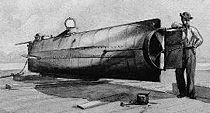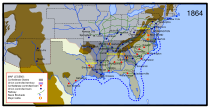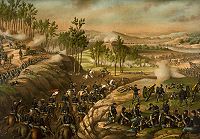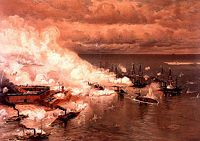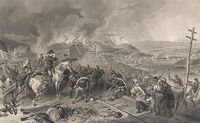1864
2008/9 Schools Wikipedia Selection. Related subjects: Years
| Centuries: | 18th century - 19th century - 20th century |
| Decades: | 1830s 1840s 1850s - 1860s - 1870s 1880s 1890s |
| Years: | 1861 1862 1863 - 1864 - 1865 1866 1867 |
Year 1864 (MDCCCLXIV) was a leap year starting on Friday (link will display the full calendar) of the Gregorian Calendar (or a leap year starting on Wednesday of the 12-day slower Julian calendar).
Events of 1864
January - March
- January 16 - Denmark rejects a Prussian-Austrian ultimatum to repeal the Danish constitution.
- January 21 - Māori Wars: The Tauranga Campaign starts.
- February 1 - Danish-Prussian War ( Second war of Schleswig): 57.000 Austrian and Prussian troops cross Eider River to Denmark.
- February 17 - American Civil War: The tiny Confederate submarine Hunley torpedoes the USS Housatonic, becoming the first submarine to sink an enemy ship. The sub and her crew of eight are also lost.
- February 25 - American Civil War: The first Northern prisoners arrive at the Confederate prison at Andersonville, Georgia. The 500 prisoners had left Richmond, Virginia seven days before.
- March 1- Alejandro Mon Menéndez takes office as Prime Minister of Spain
- March 9- American Civil War: Abraham Lincoln appoints Ulysses S. Grant commander in chief of all Union armies.
- March 10 - American Civil War: The Red River Campaign begins as Union troops reach Alexandria, Louisiana.
- March 11 - A reservoir near Sheffield, England bursts; 250 dead
April - June
- April 18 - Danish-Prussian War ( Second War of Schleswig): Battle of Dybbøl. The Prussian army fielding 10,000 men defeats the Danish defending army of 9,200 at Dybbøl Mill after an artillery bombardment from April 7 to April 18.
- April 22 - The U.S. Congress passes the Coinage Act of 1864 which mandates that the inscription "In God We Trust" be placed on all coins minted as United States currency.
- May 5 - American Civil War: The Battle of the Wilderness begins in Spotsylvania County, Virginia.
- May 7 - American Civil War: The Army of the Potomac, under General Ulysses S. Grant, breaks off from the Battle of the Wilderness and moves southwards.
- May 11 - American Civil War: Battle of Yellow Tavern - Confederate General JEB Stuart is mortally wounded at Yellow Tavern, Virginia.
- May 12 - American Civil War: Battle of Spotsylvania Court House: The "Bloody Angle" - thousands of Union and Confederate soldiers die.
- May 13 - American Civil War: Battle of Resaca - the battle begins with Union General Sherman fighting toward Atlanta.
- May 18 - Civil War gold hoax - New York World and the New York Journal of Commerce publish a fake proclamation that president Abraham Lincoln has issued a draft of 400,000 more soldiers
- May 20 - American Civil War: Battle of Ware Bottom Church - In the Virginia Bermuda Hundred Campaign, 10,000 troops fight in this Confederate victory
- May 28 - Montana is organized as a United States territory out of parts of Washington Territory and Dakota Territory, and is signed into law by President Abraham Lincoln.
- June 5 - American Civil War: Battle of Piedmont - Union forces under General David Hunter defeat a Confederate army at Piedmont, West Virginia, taking nearly 1,000 prisoners.
- June 10 - American Civil War: Battle of Brice's Crossroads - Confederate troops under Nathan Bedford Forrest defeat a much larger Union force led by General Samuel D. Sturgis in Mississippi.
- June 12 - American Civil War: Battle of Cold Harbour: - General Ulysses S. Grant pulls his troops from their positions at Cold Harbour, Virginia and moves south.
- June 15
- Arlington National Cemetery is established when 200 acres (0.8 km²) of the grounds of Robert E. Lee's home Arlington House are officially set-aside as a military cemetery by U.S. Secretary of War Edwin M. Stanton.
- American Civil War: Battle of Petersburg begins - Union forces under General Grant and troops led by Confederate General Robert E. Lee battle for the last time.
- June 21 - Māori Wars: The Tauranga Campaign ends.
July - September
- July 18 - President Lincoln issues a true proclamation of conscription of 500,000 men for the US Civil War
- July 20 - American Civil War: Battle of Peachtree Creek - Near Atlanta, Georgia, Confederate forces led by General John Bell Hood unsuccessfully attack Union troops under General William T. Sherman.
- July 22 - American Civil War: Battle of Atlanta - Outside of Atlanta, Georgia, Confederate General Hood leads an unsuccessful attack on Union troops under General Sherman on Bald Hill.
- July 24 - American Civil War: Battle of Kernstown - Confederate General Jubal Early defeats Union troops led by General George Crook in an effort to keep the Yankees out of the Shenandoah Valley.
- July 28 - American Civil War: Battle of Ezra Church begins - Confederate troops led by General Hood make a third unsuccessful attempt to drive Union forces under General Sherman from Atlanta, Georgia.
- July 29 - American Civil War: Confederate spy Belle Boyd is arrested by Union troops and detained at the Old Capitol Prison in Washington, DC.
- July 30 - American Civil War: Battle of the Crater - Union forces attempt to break Confederate lines by exploding a large bomb under their trenches.
- August 1 - Foundation of Elgin Watch Company in Elgin, Illinois.
- August 5 - American Civil War: Battle of Mobile Bay begins - At Mobile Bay near Mobile, Alabama, Admiral David Farragut leads a Union flotilla through Confederate defenses and seals one of the last major Southern ports.
- August 13 - The first fish and chips shop opens in London.
- August 18 - American Civil War: Battle of Globe Tavern - Forces under Union General Ulysses S. Grant try to cut a vital Confederate supply-line into Petersburg, Virginia, by attacking the Weldon Railroad, forcing the Confederates to use wagons.
- August 22 - First Geneva Convention; International Red Cross is founded.
- August 31 - American Civil War: Union forces led by General William T. Sherman launch an assault on Atlanta, Georgia.

Aug. 22: Red Cross
- September 1 -American Civil War: Confederate General Hood evacuates Atlanta after a four month siege mounted by Union General Sherman.
- September 2 - American Civil War: Union forces under General Sherman enter Atlanta a day after the Confederate defenders fled the city.
- September 7 - American Civil War: Atlanta, Georgia is evacuated on orders of Union General William Tecumseh Sherman.
- September 8 - Delegates from the Canadian colonies meet at the Charlottetown Conference to discuss Canadian Confederation.
October - December
- October 2 - American Civil War: Battle of Saltville - Union forces attack Saltville, Virginia but are defeated by Confederate troops.
- October 5 – Cyclone kills 70,000 in Calcutta, India
- October 9 - American Civil War: Battle of Tom's Brook - Union cavalrymen in the Shenandoah Valley defeat Confederate forces at Tom's Brook, Virginia.
- October 28 - American Civil War: Second Battle of Fair Oaks ends - Union forces under General Ulysses S. Grant withdraw from Fair Oaks, Virginia, after failing to breach the Confederate defenses around Richmond, Virginia.
- October 30
- Second war of Schleswig concluded. Denmark renounces all claim to Schleswig, Holstein and Lauenburg, which come under Prussian and Austrian administration.
- Helena, Montana is founded after four prospectors, the so-called " Four Georgians" discover gold at "Last Chance Gulch;" it was their last and agreed final attempt at weeks of trying to find gold in the northern Rockies.
- October 31 - Nevada is admitted as the 36th U.S. state.
- November 4 - American Civil War: Battle of Johnsonville - At Johnsonville, Tennessee, troops under the command of Confederate General Nathan Bedford Forrest bombard a Union supply base with artillery and destroy millions of dollars in material.
- November 7 - Capital of Idaho Territory is moved from Lewiston to Boise; North Idaho declares the move illegal and proposes secession.
- November 8 - U.S. presidential election, 1864: Abraham Lincoln is reelected in an overwhelming victory over George B. McClellan.
- November 15 - American Civil War: Sherman's March to the Sea begins - Union General Sherman burns Atlanta and starts to move south, causing extensive devastation to crops and mills and living off the land.
- November 20 - Judicial reform of Alexander II is launched in Imperial Russia.
- November 22 - American Civil War: Sherman's March to the Sea: Confederate General John Bell Hood invades Tennessee in an unsuccessful attempt to draw Union General Sherman from Georgia.
- November 25 - American Civil War: A group of Confederate operatives calling themselves the Confederate Army of Manhattan starts fires in more than 20 locations in an unsuccessful attempt to burn down New York City.
- November 29 - Indian Wars: Sand Creek Massacre - Colorado volunteers led by Colonel John Chivington massacre at least 400 Cheyenne and Arapahoe noncombatants at Sand Creek, Colorado (where they had been given permission to camp).
- November 30 - American Civil War: Battle of Franklin - The Army of Tennessee led by General Hood mounts a dramatically unsuccessful frontal assault on Union positions around Franklin, Tennessee (Hood lost six generals and almost a third of his troops).
Image:Battle of Nick Franklin II 1864.jpg
November 30: Battle of Nick Franklin.
- December 4 - American Civil War: Sherman's March to the Sea - At Waynesboro, Georgia, forces under Union General Judson Kilpatrick prevent troops led by Confederate General Joseph Wheeler from interfering with Union General Sherman's campaign of destroying a wide swath of the South on his march to Savannah, GA (Union forces did suffer more than three times the casualties as the Confederates, however).
- December 8 - Syllabus errorum: Pope Pius IX condemns theological liberalism as an error and claims for the supremacy of Roman Catholic Church authority over the civil society. He also condemns rationalism and socialism
- December 15-16 - American Civil War: Union forces decisively defeat the Confederate Army of Tennessee at the Battle of Nashville
Undated
- Imperial forces assault the Taiping capital of Nanking in the last great battle of the civil war.
- James Clerk Maxwell establishes the basis of the modern Electromagnetism and discovers microwaves
- Haiti declares independence
- Brazil invades Uruguay in support of Venancio Flores. Paraguay attacks Brazil.
- John Wisden publishes first edition of Wisden Cricketer's Almanack. It goes on to become the major annual cricket publication.
- Asa Mercer travels from Seattle to the US East Coast and recruits 11 " Mercer Girls", potential wives for men on the West Coast
Ongoing events
- American Civil War (1861-1865)
- Taiping Rebellion (1851-1864)
Births
| Gregorian calendar | 1864 MDCCCLXIV |
| Ab urbe condita | 2617 |
| Armenian calendar | 1313 ԹՎ ՌՅԺԳ |
| Bahá'í calendar | 20 – 21 |
| Berber calendar | 2814 |
| Buddhist calendar | 2408 |
| Burmese calendar | 1226 |
| Chinese calendar | 4500/4560-11-22 ( 癸亥年十一月廿二日) — to — 4501/4561-12-3( 甲子年十二月初三日) |
| Coptic calendar | 1580 – 1581 |
| Ethiopian calendar | 1856 – 1857 |
| Hebrew calendar | 5624 – 5625 |
| Hindu calendars | |
| - Vikram Samvat | 1919 – 1920 |
| - Shaka Samvat | 1786 – 1787 |
| - Kali Yuga | 4965 – 4966 |
| Holocene calendar | 11864 |
| Iranian calendar | 1242 – 1243 |
| Islamic calendar | 1280 – 1281 |
| Japanese calendar | Bunkyū 4 Genji 1 (元治元年) |
| Korean calendar | 4197 |
| Thai solar calendar | 2407 |
January - June
- January 1 - Alfred Stieglitz, American photographer (d. 1946)
- January 1 - Qi Baishi, Chinese painter (d. 1957)
- January 8 - Prince Albert Victor, Duke of Clarence (d. 1892)
- January 13 - Wilhelm Wien, German physicist, Nobel Prize laureate (d. 1928)
- January 24 - Marguerite Durand, French actress, journalist, and feminist leader (d. 1936)
- February 7 - Arthur Collins, American Singer who recorded many early songs.(d. 1933)
- March 4 - David W. Taylor, U.S. Navy architect (d. 1940)
- March 12 - William Halse Rivers Rivers, English doctor (d. 1922)
- March 13 - Alexej von Jawlensky, Russian expressionist painter (d. 1941)
- March 14 - Casey Jones, American railway engineer (d. 1900)
- March 15 - Johan Halvorsen, Norwegian composer (d. 1935)
- March 19 - Charles Marion Russell, American artist (d. 1926)
- April 21 - Max Weber, German sociologist (d. 1920)
- May 4 - Marie Booth, the third daughter of William and Catherine Booth (d. 1937)
- May 10 - Léon Gaumont, French film pioneer (d. 1946)
- May 15 - Vilhelm Hammershøi, Danish painter (d. 1916)
- June 3 - Ransom E. Olds, automotive pioneer (d. 1950)
- June 11 - Richard Strauss, German composer (d. 1949)
- June 13 - Dwight B. Waldo, American educator and historian (d. 1939)
- June 25 - Walther Nernst, German chemist, Nobel Prize laureate (d. 1941)
July - December
- July 11 - Petar Danov, Bulgarian spiritual teacher (d. 1944)
- July 12 - George Washington Carver, American botanist (d. 1943)
- July 13 - John Jacob Astor IV, American businessman and inventor (d. 1912)
- July 20 - Erik Axel Karlfeldt, Swedish writer, Nobel Prize laureate (d. 1931)
- July 23 - Apolinario Mabini, Filipino political theoretician and Prime Minister (d. 1903)
- August 9 - Roman Dmowski, Polish politician (d. 1939)
- September 14 - Robert Cecil, 1st Viscount Cecil of Chelwood, English politician and diplomat, recipient of the Nobel Peace Prize (d. 1958)
- October 10 - T. Frank Appleby, United States Congressman from New Jersey (d. 1924)
- October 25 - Alexander Gretchaninov, Russian composer (d. 1956)
- October 31 - Cosmo Lang, Archbishop of Canterbury (d. 1945)
- November 11 - Alfred Hermann Fried, Austrian writer and pacifist, recipient of the Nobel Peace Prize (d. 1921)
- November 13 - Bishop James Cannon Jr, American religious and temperance movement leader (d. 1944)
- November 16 - Stephane Javelle, French astronomer (d. 1917)
- November 23 - Henry Bourne Joy, American business leader (d. 1936)
- November 24 - Henri de Toulouse-Lautrec, French painter (d. 1901)
- November 26 - Edward Higgins, the 3rd General of The Salvation Army (d. 1947)
- December 6 - William S. Hart, American film actor (d. 1946)
- December 12 - Paul Elmer More, American critic and essayist (d. 1937)
Deaths
January - June
- January 13 - Stephen Foster, American composer (b. 1826)
- April 4 - Joseph Pitty Couthouy, American naval officer (b. 1808)
- May 2 - Giacomo Meyerbeer, German composer (b. 1791)
- May 9 - John Sedgwick, Union General, American Civil War (b. 1813)
- May 12 - J.E.B. Stuart, Confederate Cavalry General, American Civil War
- May 19 - Nathaniel Hawthorne, American author (b. 1804)
- June 1 - Hong Xiuquan, Chinese rebel (b. 1812)
- June 14 - Patrick Kelly, US Army officer (in battle)
- June 15 - William E. Jones, Confederate general (in battle) (b. 1824)
July - December
- September 3 - Emil Nobel, younger brother of Alfred Nobel (killed in an explosion)
- October 12 - Roger Taney, United States Supreme Court Justice (b. 1777)
- November 6 - Tuanku Imam Bonjol, Indonesian religious and military leader (b. 1772)
- November 30 - John Adams, (Confederate Army officer (in battle) (born 1825)
- December 1 - William L. Dayton - United States Minister to France (b.1807)
- December 8 - George Boole, English mathematician and philosopher (b. Nov. 2 1815)
- December 21 - Archduke Louis of Austria (born 1784)
